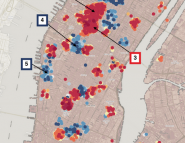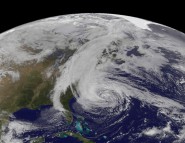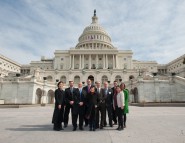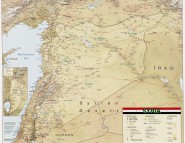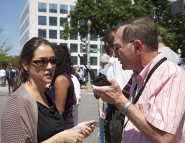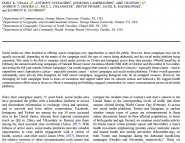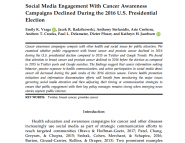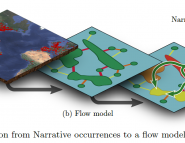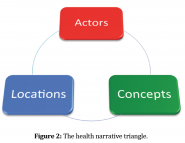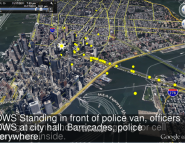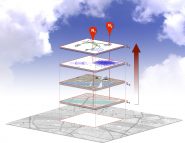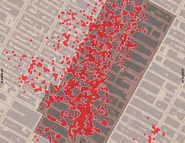
The GeoSocial Gauge is brought to you by (left to right) Jacek Radzikowski, Arie Croitoru, Anthony Stefanidis, and Andrew Crooks.
Anthony Stefanidis
Anthony Stefanidis is a Professor with the Department of Geography & Geoinformation Science at George Mason University, and the director of Mason’s Center for Geospatial Intelligence. Anthony’s areas of expertise include the analysis of digital imagery and video, spatiotemporal information modeling and analysis, sensor networks, and the harvesting of geospatial information from social media. His current research activities are funded by IARPA, the National Geospatial Information Agency (NGA), Draper Lab, and the Army Geospatial Center. His past research activities include projects funded by NSF, NGA, NASA, the USGS, and the European Union, with multimillion-dollar total budgets.
In addition to his research activities he is teaching courses on image and video analysis, geospatial intelligence, spatial information systems, and spatial statistics, and (soon) on geosocial analysis. Dr. Stefanidis is a member of the Academic Advisory Board of the US Geospatial Intelligence Foundation (USGIF).
Further information: Website | Twitter | email
Andrew Crooks
Andrew Crooks is Assistant Professor with the Department of Computational Social Science and member of the Center for Social Complexity at George Mason University. Andrew’s areas of expertise relates to working with GIS, creating and analyzing large spatial data sets and finding patterns and insights from such data, in a sense he specializes in turning data into information. Dr. Crooks is a recognized expert on the integration of GIS and agent-based modeling (ABM). Recently this expertise has lead to him co-edit a book entitled Agent- based Models of Geographical Systems. Currently, Dr Crooks is co-editor of Cartographica: The International Journal for Geographic Information and Geovisualization and is on the editorial board of Future Internet. He is regularly requested to review articles for leading journals in the fields of modeling and simulation along with more traditional GIS papers. Dr. Crooks has published several papers with respect to Neogeography, Volunteered Geographic Information and crowd sourcing and social media in a geographical setting. His current research activities are funded by Draper Lab, EADS North America and the Army Geospatial Center.
In addition to his research activities, he is teaching several graduate level courses on ABM of urban systems, spatial agent-based models of human-environment interactions, land-use modeling techniques and applications, GIS and ABM and building virtual worlds.
Further information: Blog | Website | Twitter
Arie Croitoru
Arie Croitoru is an Associate Professor with the Department of Geography & Geoinformation Science at George Mason University, and a member of Mason’s Center for Geospatial Intelligence. Arie’s research focuses on three interrelated research streams: Geosocial Analysis and Location-Based Mass Collaboration Systems (LB-MCS), spatiotemporal data mining, and digital image processing. Currently, Dr. Croitoru’s work focuses on developing novel algorithms for modeling, abstraction, and automated knowledge discovery in location-aware social media, and on the design and development of Geosocial Analysis platforms. The long-term objective of his research agenda is to develop an algorithmic foundation that will open the way to an entirely new class of intelligent spatial information systems and products that will transform the way spatiotemporal knowledge is produced. A fundamental element of this vision is the incorporation of large-scale collaborative and social communities as both consumers and producers of data, information, and knowledge.
Dr. Croitoru’s research activities have been funded by the National Science and Engineering Research Council of Canada (NSERC), the Canadian Foundation of Innovation (CFI), CANARIE Canada, the Alberta Center for Child, Family and Community research (Canada), Alberta Health Services (Canada), the City of Edmonton (Alberta, Canada), and Draper Lab (USA). In addition to his research activities, Dr. Croitoru has been teaching courses in Digital Image processing, Remote Sensing, Geographic Information Systems and Remote Sensing, and Earth Observation Systems.
Dieter Pfoser
Dieter Pfoser is an Associate Professor at the Department of Geography and Geoinformation Science, George Mason University. He received his PhD degree in Computer Science from Aalborg University, Denmark in 2000. His employment record includes research assistant at Department of Spatial Information Science and Engineering, University of Maine, USA (1996-97), assistant professor at the Department of Computer Science, Aalborg University, Denmark (2000-02), a researcher at the Computer Technology Institute, Greece (2002-2008), and a senior researcher and head of the Geoinformatics dept. at IMIS, Research Center “ATHENA” in Athens, Greece (2008-2012). Dr. Pfoser’s research has addressed various aspects of spatial database research as well as related areas such as computational geometry and transportation research. He produced theoretical research results as well as practical work that are now used in actual applications and products. His early work focused on spatiotemporal databases and specifically on the modeling of such data as well as query optimization including indexing. He developed a spatiotemporal index, the TB-tree for trajectory data and a framework for capturing the uncertainty related to trajectory data and on query processing for moving objects’ data. Later, the focus of his work shifted towards data management for fleet management applications. The main result was a robust map-matching algorithm that translated large amounts of vehicle-tracking data to travel times. Additional work addressed data management techniques that allow for a live assessment of the traffic situations in urban areas as well as a shortest-path algorithm that exploits network hierarchies. This technology was commercialized and is currently used in fleet management products. Recent work addresses user-generated geospatial content, i.e., how to exploit geospatial data sets generated by Web users (point cloud data, travel blogs). This domain is tightly coupled with language processing problems, i.e., how do users express spatial relationships in natural language terms, and data fusion, i.e., how to integrate and improve the quality of user-generated data.
Further information: Website
Jacek Radzikowski
Jacek Radzikowski is a Senior Researcher with Mason’s Center for Geospatial Intelligence. He holds degrees in Computer Science from Warsaw University of Technology and Computational Science from Mason. Jacek’s areas of expertise are database management and development, software design, system implementation, and general IT wizzardy (on many occasions he has made IT problems disappear into thin air, though he is still working on making rabbits appear). His publications on harvesting information from social media have been featured in a variety of journals and conferences.
Further information: Twitter
